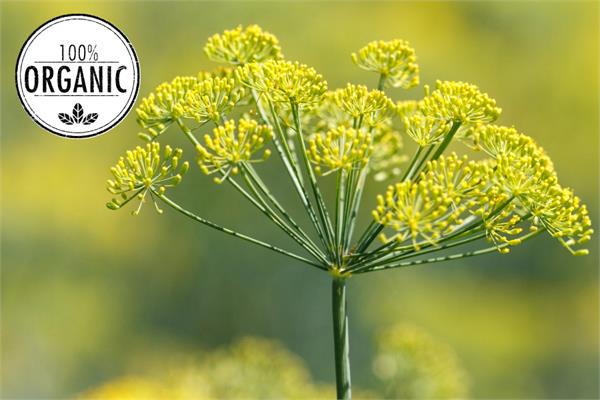
Australian Owned and Operated We have been proudly running for over 30 years

100% Pure & Natural Our products are sourced from the highest quality suppliers and growers from around the world

Not Tested on Animals None of our products are tested on animals

Vegan Friendly Our products are plant based and vegan friendly
Organic Sweet Fennel
Foeniculum vulgare
Source: Organic Whole Seeds
Origin: Hungary
Energetics: Yang
Extraction Method: Steam Distilled
Scent: A sweet, licorice-like aroma.
Blends Well With: All kinds of Cedarwood and Lavender oil blends.
About
Fennel essential oil, distilled from the seeds of the Foeniculum vulgare plant, is a versatile oil known for its distinct aroma and therapeutic properties. With its sweet, licorice-like scent, fennel oil is cherished for its digestive support, helping to ease bloating, gas, and indigestion. Its calming and balancing properties make it beneficial for promoting mental clarity and emotional well-being. Fennel oil is also valued for its ability to support healthy skin, aiding in the reduction of blemishes and promoting a clear complexion. Whether diffused, applied topically, or used in aromatherapy blends, fennel essential oil offers a refreshing and revitalising experience, making it a valuable addition to natural wellness routines.
Ayurvedic Uses
In Ayurveda, fennel essential oil, derived from the seeds of the Foeniculum vulgare plant, is valued for its multifaceted therapeutic properties. Known as "Shatapushpa" in Sanskrit, fennel oil is revered for its ability to pacify the Vata and Kapha doshas, bringing balance and harmony to the mind and body. Its carminative properties make it particularly beneficial for supporting digestion, alleviating bloating, and relieving gastrointestinal discomfort. Fennel oil is also esteemed for its detoxifying effects, aiding in the elimination of toxins from the body and promoting overall wellness. Additionally, its sweet, licorice-like aroma has a calming influence on the nervous system, making it useful for reducing stress and promoting relaxation. Whether used topically, aromatically, or internally under the guidance of a qualified practitioner, fennel essential oil offers a natural and holistic approach to health and vitality in Ayurvedic practice.
Historical Snippets
Fennel essential oil has a rich history dating back to ancient civilisations such as Egypt, Greece, and Rome, where it was revered for its medicinal and culinary properties. In ancient Egypt, fennel was valued for its digestive benefits and was commonly used in herbal remedies and rituals. The Greeks and Romans appreciated fennel for its aromatic qualities and believed it imparted strength and courage. Fennel seeds were also used as food and medicine during the Middle Ages and Renaissance periods, with renowned herbalists such as Hildegard von Bingen advocating for their therapeutic use. Over the centuries, fennel essential oil has remained a staple in traditional medicine systems around the world, prized for its ability to support digestion, promote relaxation, and enhance overall well-being. Today, fennel essential oil continues to be valued for its diverse range of health benefits and is widely used in aromatherapy, skincare, and culinary applications.
Key Constituents
- Trans-anethole - 74.74%
- limonene - 7.65%
- fenchone - 7.55%
- alpha-Pinene - 3.45%
How To Use
Diffuse: Add a few drops to a diffuser to disperse around the room
Topically: Dilute essential oil with any carrier oil at a 2.5% ratio. This equates to 2.5ml essential oil/oils in total mixed with 100ml of chosen carrier oil. 1ml of essential oil is approximately 20-22 drops of oil. Decant into a roller or glass bottle with eye dropper to apply easily or a larger bottle if using for massage. Please note this dilution rate is for adults and children over the age of 6. More information on children and essential oils is on our blog page. Essential Oils should not be used directly on the skin without mixing first with a carrier oil
Inhalation: Add 1-2 drops essential oil to a tissue and inhale at a distance while ensuring that the oil does not come into direct contact with the skin. Alternatively, you can smell the oil directly from the bottle.
Shelf Life
Our freshly decanted Organic Fennel essential oil will last for 2-3 years minimum from when you open your amber glass bottle if stored correctly.
Primary Storage Considerations: Keep away from direct light (U.V. radiation). Keep in the amber glass bottle with lid tightly closed. Only open when you need to and decant into a smaller "working" amber glass bottle if possible (and label so you know what is in it). This is to reduce oxidation.
Secondary Storage Considerations: Keep in a refrigerator at around 4 degrees celsius.
Safety
General
Some essential oils may cause photosensitivity to the skin - Use diluted in Jojoba or other complete carrier oil.
Do not ingest essential oils.
Do not apply to eyes, sensitive areas or mucous membranes.
The information on this website is not intended to be used in the diagnosis, treatment or mitigation of any physical or mental illness. Ahimsa Oils offer no advice or recommendations only general information. No therapeutic claims are made within.
Pregnant women, nursing mothers and children should not use essential oils without first consulting an appropriately trained healthcare practitioner.
The statements on this website have not been evaluated by the TGA. David Bosley however worked for a long period in consultation with the TGA to ensure correct labelling with reference to the Ahimsa Oil product range.
Specific
Tisserand and Young indicate that Fennel Oil may interact with medication, and that it may inhibit blood clotting. They precaution to avoid use of the oil topically if it has oxidized as skin sensitization is more likely. Their contraindications include pregnancy, breastfeeding, endometriosis, estrogen-dependent cancers, and children under 5. Their dermal maximum is 2.5%.
References
Tisserand, R., & Young, R. (2014). Essential Oil Safety: Second edition



 Available for $100 orders and over
Available for $100 orders and over

